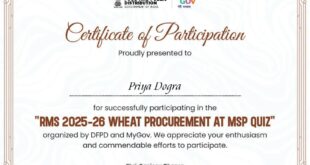Apply Link: CLICK HERE
I am going to share an information about the online quiz on World Pharmacist Day organized by Rajeev Gandhi College of Pharmacy, Bhopal. Each Participant will Get E- Certificate for the Quiz Contest who secures more than 50% score. Quiz Contest Participation is Open on 25th September 2020 from 09:30 am to 04:00 pm.
Pharmacists are a type of health professional who has specialization in medicines. They know the use, benefits, and side effects of the medicine. In order to recognize the branch of pharmacy and work of pharmacists in 2009, the FIP council of Istanbul (Turkey) designated 25th September as World Pharmacist Day.
This year is celebrated as the 10th year of world pharmacist day. The theme of this year’s world pharmacist day is “Transforming Global Health”. It is an opportunity to communicate with every common people residing in the world about pharmacist’s nature of work. The work of pharmacists must be recognized about how he is transforming health by providing different types of services in their communities like advising on living, prevention and cure or treatment of disease with the help of good quality standards and medicines. Professionals associated with pharmacy education are trying to transform a common person into a competent and well-qualified pharmacist so that they can serve the society in all manners.
Each Participant will Get E- Certificate for the Quiz Contest who secures more than 50% score.Quiz Contest Participation is Open on 25th September 2020 at 09:30 am to 04:00 pm.
Online Pharma Quiz Competition on World Pharmacist Day :
Q1) What makes pharmacists unique in the health care team? *
- Pharmacists advise patients on how take their medicines.
- Pharmacists are experts on communicating with patients and other health care professionals.
- Pharmacists have access to a vast amount of knowledge on medicines and the actions of drugs.
- Pharmacists are experts on medicine formulation and use and can apply this to patient care.
Q2) All new prescription medicines must be issued with a marketing authorization from MHRA before they can: *
- Undergo phase I clinical trials
- Undergo phase III clinical trials
- Be advertised to public
- Be advertized to prescribers
Q3) To compare the safety of one medicine with another medicine it would be necessary to: *
- Review the evidence from Phase I clinical trials.
- Review the evidence from Phase II clinical trials.
- Review the evidence from a post marking clinical trial.
- Review the number of reports obtained from the yellow card adverse drug reaction reporting scheme.
Q4) The separation of prescribing and dispensing into different roles was a key stage in the evolution of healthcare. The separation came about with: *
- The formation of the Pharmaceutical Society in 1841
- The registration of chemists and druggists in 1868
- The National Insurance Act in 1911
- The formation of the NHS in 1948
Q5) The role of the pharmacy regulator (the General Pharmaceutical Council) is:
- To protect, promote and maintain the health, safety and wellbeing of members of the public in order to uphold standards and public trust in pharmacy.
- To raise the standing of the profession and to protect the interests of its members.
- To promote pharmacy and to advance science, practice, and education in pharmacy.
- To protect the interests and rights of members of the pharmacy profession
Q6) An SOP is a recognized abbreviation for? *
- Staffing of Pharmacies
- Student of pharmacy
- Standard operating procedure
- Surgical operating parameters
Q7) Who can inspect pharmacist’s continuing professional development records? *
- NICE
- General Pharmaceutical Council
- Monitor
- Strategic Health Authority
Q8) Beneficence may be defined as… *
- Avoiding causing harm to a patient
- Promoting well being or doing good for a patient
- Respecting the decisions of a patient
- All of the above
Q9) Which of the following courts is able to hear an appeal by a pharmacist against a decision of the GPhC fitness to practice committee to remove their name from the register? *
- Only high court
- Only court of session
- Either the high court or court of session
- Neither the high court nor the court of session
Q10) A pharmacy student is caught by the police supplying cannabis resin to four of his non pharmacy friends on a university campus. What is the maximum prison sentence that a magistrates’ court in England could impose? *
- 3 months
- 6 months
- 2 years
- 14 years
Q11) Who is regulated by the NMC? *
- Both nurses and midwives.
- Only nurses
- Nurses and medics
- Only midwives
Q12) A podiatrist is the health care professional responsible for *
- The diagnosis of brain
- The study of toes and toenails
- The study of child hood illness
- The study, diagnosis and treatment of disorders of the foot, ankle and lower leg.
Q13) Social workers work in a variety of organizations and these would include: *
- Those in the public (local authority/health), voluntary (not for profit) and private (for profit) sectors.
- Only the private sector
- Only the public sector
- Only hospitals
Q14) What is interprofessional education? *
- Two professions sitting in same classroom for lectures
- Two student groups out in placement together but with no interaction
- Interprofessional education has been defined as: “ Occasions when two or more professions learn with, from and about each other to improve collaboration and the quality of care”
- It is when one profession is told what another professions’ role is
Q15) CAIPE stands for: *
- Centre for the Assessment of Interprofessional Education
- Centre for the Advancement of Interprofessional Education
- Committee for the Archiving of Interdisciplinary Effort
- Committee For The Assessment Of Interdisciplinary Education
 Priya Dogra – Certification | Jobs | Internships
Priya Dogra – Certification | Jobs | Internships




YES